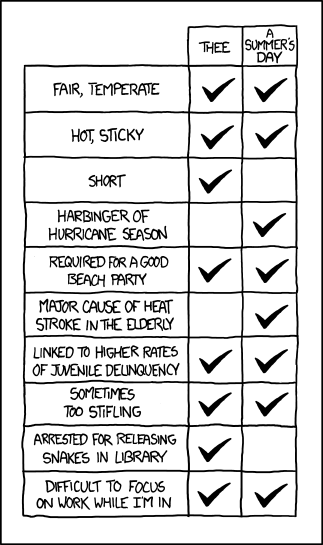Song at Sunset, by Walt Whitman (1819-1892)

Splendor of ended day floating and filling me,
Hour prophetic, hour resuming the past,
Inflating my throat, you divine average,
You earth and life till the last ray gleams I sing.
Open mouth of my soul uttering gladness,
Eyes of my soul seeing perfection,
Natural life of me faithfully praising things,
Corroborating forever the triumph of things.
Illustrious every one!
Illustrious what we name space, sphere of unnumber'd spirits,
Illustrious the mystery of motion in all beings, even the tiniest insect,
Illustrious the attribute of speech, the senses, the body,
Illustrious the passing light--illustrious the pale reflection on
the new moon in the western sky,
Illustrious whatever I see or hear or touch, to the last.
Good in all,
In the satisfaction and aplomb of animals,
In the annual return of the seasons,
In the hilarity of youth,
In the strength and flush of manhood,
In the grandeur and exquisiteness of old age,
In the superb vistas of death.
Wonderful to depart!
Wonderful to be here!
The heart, to jet the all-alike and innocent blood!
To breathe the air, how delicious!
To speak--to walk--to seize something by the hand!
To prepare for sleep, for bed, to look on my rose-color'd flesh!
To be conscious of my body, so satisfied, so large!
To be this incredible God I am!
To have gone forth among other Gods, these men and women I love.
Wonderful how I celebrate you and myself
How my thoughts play subtly at the spectacles around!
How the clouds pass silently overhead!
How the earth darts on and on! and how the sun, moon, stars, dart on and on!
How the water sports and sings! (surely it is alive!)
How the trees rise and stand up, with strong trunks, with branches
and leaves!
(Surely there is something more in each of the trees, some living soul.)
O amazement of things--even the least particle!
O spirituality of things!
O strain musical flowing through ages and continents, now reaching
me and America!
I take your strong chords, intersperse them, and cheerfully pass
them forward.
I too carol the sun, usher'd or at noon, or as now, setting,
I too throb to the brain and beauty of the earth and of all the
growths of the earth,
I too have felt the resistless call of myself.
As I steam'd down the Mississippi,
As I wander'd over the prairies,
As I have lived, as I have look'd through my windows my eyes,
As I went forth in the morning, as I beheld the light breaking in the east,
As I bathed on the beach of the Eastern Sea, and again on the beach
of the Western Sea,
As I roam'd the streets of inland Chicago, whatever streets I have roam'd,
Or cities or silent woods, or even amid the sights of war,
Wherever I have been I have charged myself with contentment and triumph.
I sing to the last the equalities modern or old,
I sing the endless finales of things,
I say Nature continues, glory continues,
I praise with electric voice,
For I do not see one imperfection in the universe,
And I do not see one cause or result lamentable at last in the universe.
O setting sun! though the time has come,
I still warble under you, if none else does, unmitigated adoration.









 (
(